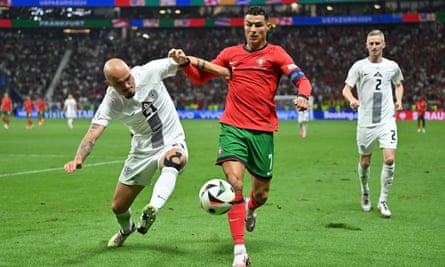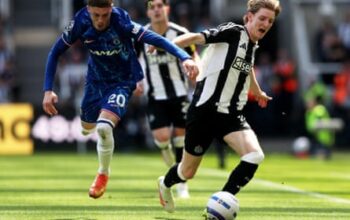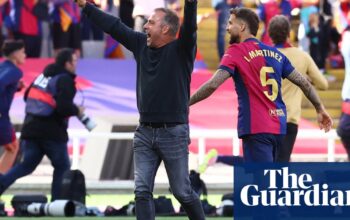There is a fascination always as legends fade, to watch how they rage against the diminution of their own powers, to see embodied in one shrugging, pouting frame the eternal human battle with mortality. Decay and decrepitude have their allure; what the romantics saw in a ruined abbey, so others will see in the dwindling figure of Cristiano Ronaldo.
Some day there will be a Portugal match that is not about Ronaldo – but not here, not yet. It wasn’t just about the penalty he had saved by Jan Oblak in extra time, which left him in tears. He did, at least, make up for it in the shootout. Everything is about Ronaldo; Portuguese football has become the great psychodrama of his ageing. Diogo Costa may have saved three penalties in the shootout, but even then this was about Ronaldo.
Even when Gonçalo Ramos scored three against Switzerland at the last World Cup, the sense was that he was a supporting actor, less the hat-trick hero than the bloke who replaced Ronaldo, whose name was bellowed by the crowd until finally he was brought on – at which point he lumbered about before celebrating a goal that was hilariously offside but delighted the thousands of tourists in his thrall nonetheless. Defeat by Morocco in the game that followed reopened the door. Ronaldo scored 10 in qualifying, a feat that would seem more impressive had half of them not come against Luxembourg and Liechtenstein. But records are records and Ronaldo is at the stage of his career when his main joy seems to be to extend them.
His pass when clean through against Turkey to tee up Bruno Fernandes seemed uncharacteristic – until it became apparent that it made him the most prolific assist provider in European Championship history, and it suddenly made sense. Maybe that’s unfair; maybe in his dotage he has discovered the joy of giving. After all, he doesn’t actually have to score any more to draw great roars of approval.
Ten minutes before half-time he flicked a return pass to the surging Rafael Leão. The reaction was tumultuous: the man they had come to see do tricks had done a trick. No matter that the ball wasn’t far enough in front of Leão and got caught in his stride: in this world of celebrity worship, the winning of football matches is a secondary concern.

In that context, this was a Ronaldo masterclass as he ran through his repertoire of gestures and expressions. When Petar Stojanovic shrugged him off the ball after nine minutes, there was a classic arms-outstretched, Christ the Redeemer pose. Six minutes before half-time, he edged a free-kick from wide on the left closer to the box. The referee, Daniele Orsato, moved it back. Ronaldo pointed, gave a sarcastically incredulous grin, then belted his shot out for a goal‑kick. And he has stamina; 15 minutes from time, he was giving a disbelieving finger wag after being manifestly offside.
The Ronaldo free-kick is one of the great set pieces of the modern game. There’s never a doubt he’s going to take it. Somebody goes and fetches the ball and hands it over. The wall steels itself. Ronaldo sniffs then puffs out his cheeks, and, as thousands of people in the stadium raise their phones to record the sacral moment, he addresses the ball like some weird amalgam of Jonny Wilkinson and one of the actors from the third season of Blackadder – and then belts it over. A David Peace novel about this team would be remarkably similar to the experience of watching them: endless stylised repetitions in the service of a pervasive paranoia.
There was a second-half strike that went through the wall and was beaten away by Oblak, but mostly these days a Ronaldo free- kick is the prelude to a goal‑kick. By the end, he had had 19 shots in the competition, two more than Scotland, and yet has somehow scored two goals fewer.
The free-kicks aside, there was an array of poor touches that led to possession being lost and, perhaps most striking of all, a series of crosses that he narrowly failed to get on the end of. The spring is no longer quite there, the synapses not quite so sharp, the reflexes slightly lacking. Chances he would once have buried now go to waste. Vanja Drkusic is an unheralded 24-year-old centre‑back for Sochi, yet he had Ronaldo’s measure here, both for pace and in the air.
In normal circumstances, the question would be whether Roberto Martínez could continue to pick a player so out of sorts, the magnitude of whose presence caused imbalances even when he was good. But this is Portugal and this is Ronaldo. He will start against France in the quarter-final.
Yet you wonder whether Portugal’s hordes of gifted attacking players mind being bit‑part players in the Ronaldo show. And you wonder as well about the wisdom of taking an immensely talented squad to the World Cup and this European Championship and then treating them as essentially a farewell tour. Opportunities to win tournaments, real opportunities, come very rarely; to sacrifice them before the ego of a fading star, no matter how great he once was, seems indefensible.
Source: theguardian.com


